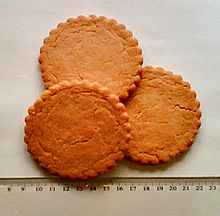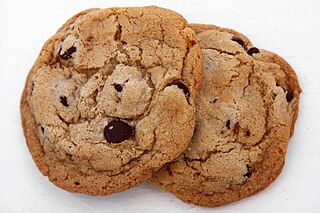
A cookie or biscuit is a baked snack or dessert that is typically small, flat, and sweet. It usually contains flour, sugar, egg, and some type of oil, fat, or butter. It may include other ingredients such as raisins, oats, chocolate chips, or nuts.

Newtons are a Nabisco-trademarked version of a cookie filled with sweet fruit paste. "Fig Newtons" are the most popular variety. They are produced by an extrusion process. Their distinctive shape is a characteristic that has been adopted by competitors, including generic fig bars sold in many markets.

A biscuit, in many English-speaking countries, including Britain, Ireland, Australia, New Zealand, India, and South Africa but not Canada or the US, is a flour-based baked and shaped food item. Biscuits are typically hard, flat, and unleavened. They are usually sweet and may be made with sugar, chocolate, icing, jam, ginger, or cinnamon. They can also be savoury, similar to crackers. Types of biscuit include biscotti, sandwich biscuits, digestive biscuits, ginger biscuits, shortbread biscuits, chocolate chip cookies, chocolate-coated marshmallow treats, Anzac biscuits, and speculaas.
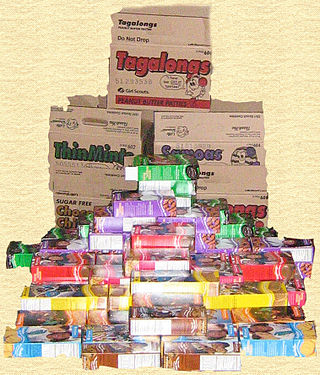
Girl Scout Cookies are cookies sold by Girl Scouts in the United States to raise funds to support Girl Scout councils and individual troops. The cookies are widely popular and are commonly sold by going door-to-door, online, through school or town fundraisers, or at "cookie booths" set up at storefronts. The program is intended to both raise money and improve the financial literacy of girls. During an average selling season, more than one million girls sell over 200 million packages of cookies and raise over $800 million. The first known sale of cookies by Girl Scouts was in 1917. Cookie sales are organized by 112 regional Girl Scout councils who select one of two national bakeries to buy cookies from.

Dough is a thick, malleable, sometimes elastic paste made from grains or from leguminous or chestnut crops. Dough is typically made by mixing flour with a small amount of water or other liquid and sometimes includes yeast or other leavening agents, as well as ingredients such as fats or flavourings.

Hardtack is a type of dense cracker made from flour, water, and sometimes salt. Hardtack is inexpensive and long-lasting. It is used for sustenance in the absence of perishable foods, commonly during long sea voyages, land migrations, and military campaigns. Along with salt pork and corned beef, hardtack was a standard ration for many militaries and navies from the 17th to the early 20th centuries.

Lebkuchen, Honigkuchen or Pfefferkuchen are honey-sweetened German cakes, moulded cookies or bar cookies that have become part of Germany's Christmas traditions. They are similar to gingerbread.

Shortbread or shortie is a traditional Scottish biscuit usually made from one part white sugar, two parts butter and three to four parts plain wheat flour. Shortbread does not contain any leavening, such as baking powder or baking soda. Shortbread is widely associated with Christmas and Hogmanay festivities in Scotland, and some Scottish brands are exported around the world.

Gingerbread refers to a broad category of baked goods, typically flavored with ginger, cloves, nutmeg, and cinnamon and sweetened with honey, sugar, or molasses. Gingerbread foods vary, ranging from a moist loaf cake to forms nearly as crisp as a ginger snap.

Christmas cookies or Christmas biscuits are traditionally sugar cookies or biscuits cut into various shapes related to Christmas.

Stella D'oro is an American brand of cookies and breadsticks owned by Snyder's-Lance. Stella D'oro means "star of gold" in Italian, and the cookies are inspired by Italian baking. Its products include breadsticks, Swiss Fudge and other cookies, biscotti, and their S-shaped breakfast treats.

Biscocho, also spelled biskotso, refers to various types of Filipino twice-baked breads, usually coated with butter and sugar, or garlic in some cases. Biscocho is most strongly associated with the versions from the province of Iloilo, although it actually exists nationwide in various forms. It is also known as biscocho duro, machacao, or matsakaw. It is also historically known as pan de caña.
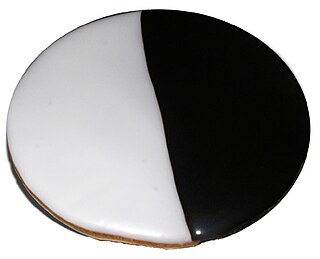
Black-and-white cookies, half-and-half cookies, and half-moon cookies are similar round cookies iced or frosted in two colors, with one half vanilla and the other chocolate. They are found in the Northeastern United States and Florida. Black-and-white cookies are flat, have fondant or sometimes royal icing on a dense cake base, and are common in the New York metropolitan area. Half-moon cookies are slightly dome-shaped (convex), have frosting on a fluffy angel cake base, and are common in Central New York and Boston, Massachusetts.
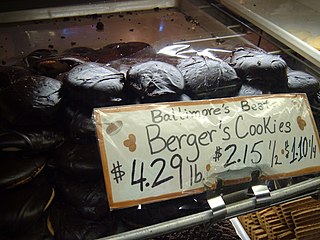
Berger Cookies are a handmade cookie made and marketed by DeBaufre Bakeries of Baltimore, Maryland. The cookies are widely known for their thick, chocolate frosting on an imperfectly shaped shortbread cookie. Not unlike a black and white cookie, the Berger Cookie is frosted on its flat bottom, giving the final cookie an overall rounded shape. Each weighs 1.25 ounces, with the cake-like under-cookie weighing a quarter of an ounce, and the chocolate/fudge frosting weighing an ounce. DeBaufre distributes packaged Berger Cookies via a delivery network around Baltimore and markets the cookies worldwide via internet sales.
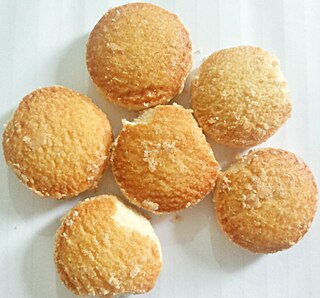
Nankhatai are shortbread biscuits originating from the Gujarat region of the Indian subcontinent, popular in Northern India, Pakistan, Bangladesh, Sri Lanka, and Myanmar.
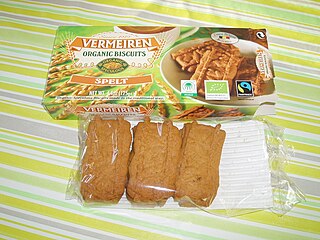
Speculoos is a biscuit, originally manufactured in Belgium, made from wheat flour, candy syrup, fat, and sometimes cinnamon. Speculoos were developed in the 20th century around the area of Verviers, as an alternative for people who could not afford Dutch speculaas. Belgian Speculoos includes fewer spices than Dutch speculaas, as the spices were much more expensive to import to Belgium than to the Netherlands. The origins of speculaas are much older. In the 2020s the names speculaas and speculoos are sometimes used interchangeably in Flanders.

Kleeb lamduan or lamduan flower shortbread cookie is a Thai biscuit in the shape of lamduan flowers. It is traditionally made from one part of white sugar, two parts of flour, and lard. Kleeb Lamduan cookies are uniquely made by placing them in a container with a tian op (เทียนอบ) scented candle used for dessert making. When the container is closed the candle is extinguished and the aromatic smoke is trapped inside. Modern recipes are also often adapted from the original by using icing sugar instead of caster sugar, vegetable oil instead of lard and some bakers add a portion of salt.
